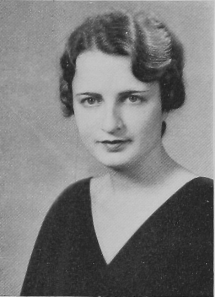Abstract
Bella Skolnik’s interview provides a passionate story of activism in health, education, and welfare. She begins by reflecting on her thoughtful and supportive family and her childhood and moves on to tell vivid stories of her freshman year at Pembroke College, including her college friendships, house mother, dating, dormitories, “gracious living,” and seeing the world through rose colored glasses. She considers the stock market crash in October 1929and the way it formed her and her peers’ college careers. She talks about her courses and professors, and her marriage to her husband at the end of her senior year at Brown. Also in Part 1, Skolnick begins to discuss her work with handicapped children, and becoming a private tutor and social worker.
In track 2, Skolnick expands on her activism, and the process of beginning the Rhode Island Chapter of Crippled Children and Adults as part of the Easter Seal Agency of Rhode Island. Her stories speak to the process of activism and working within communities to assess need as a base of advocacy and education. She moves on to discuss transitioning from working with handicapped children to working with the elderly, using the same process of surveying, advocacy, and education to establish organizations working to make social services accessible to the elderly community.
In track 3, Skolnick considers the arch of her career and the triumph at seeing changes at an institutional level. She ends her interview by contemplating the gratitude she has for her life.
Part 1
Part 2
Part 3
Part 4
Part 5
Recorded on June 23, 1992 in the Pembroke Center, Brown University, Providence, RI
Interviewed by Barbara Anton
Suggested Chicago style citation: Skolnick, Bella. Interview. By Barbara Anton. Pembroke Center Oral History Project, Brown University. June 23, 1992.
Biography
Bella Skolnik grew up in Rhode Island and attended high school in Woonsocket, where she graduated at the top of her class. She attended Pembroke College in 1929, majoring in English and studying psychology extensively. In 1933, during the last month of her time at Pembroke, she married Bob Krovitz. After her graduation, she was hired by the state of Rhode Island to investigate the situation of handicapped children, who at the time were barred from public school and were often hidden by their parents because of a lack of social support. She became a private tutor and social worker for handicapped children, a job which galvanized her to activism for the children she was working with. Active in her son’s education, she became president of the PTA before becoming chairman of the committee on exceptional children in the Providence Council of Parents and Teachers in 1945. She organized a Rhode Island chapter of the Easter Seal Agency, a national organization that provides services, education, outreach, and advocacy on behalf of people with disabilities. She raised money and educated the community, working with teachers to recognize invisible disabilities and working on national legislation to make public buildings accessible for people with disabilities. Skolnick moved to Massachusetts, where she began working with the Council on Aging, and built public housing and devised educational programs for the elderly. She remained active within the handicapped and elderly communities throughout her life, always responding to issues within the communities and working with the state to fix them. When her husband’s health declined, they moved to Florida, where she maintained the great network of activists she cultivated throughout her career.
